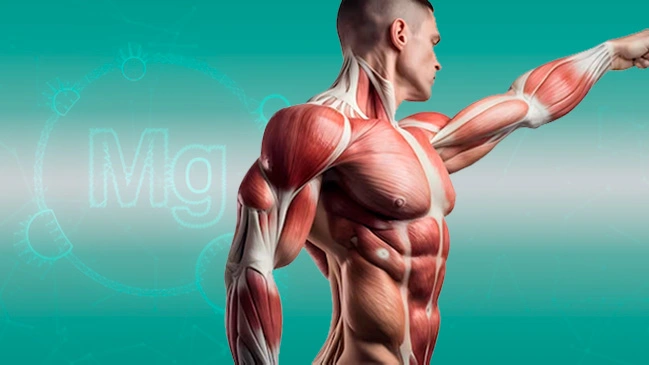Magnesium is a crucial mineral for those looking to improve their physical performance and increase muscle mass. While not as popular as creatine or protein, its role in muscle development is vital. Magnesium is responsible for over 300 biochemical reactions in the body and plays a key role in muscle function, energy production, and post-workout recovery. (1)

Benefits of Magnesium for Muscle Health:
1. Energy Production: Magnesium is essential for the synthesis of ATP, the main energy source for our cells. During exercise, ATP breaks down to provide energy to muscles, allowing muscle contraction. Adequate magnesium levels ensure this process runs efficiently, helping you train more intensely and for longer periods.

2. Muscle Contraction and Relaxation: This mineral is crucial for regulating calcium, which is responsible for muscle contraction. Without enough magnesium, muscles may remain in a constant state of contraction, leading to cramps and spasms. Magnesium helps relax muscles, preventing discomfort and enhancing recovery after exercise.
3. Protein Synthesis: Building new muscle fibers requires magnesium. After intense training, the body enters a phase of muscle repair and growth. During this stage, magnesium is necessary for protein synthesis, which helps muscles strengthen and grow.
4. Reduction of Oxidative Stress and Inflammation: Intense exercise can generate oxidative stress and inflammation, affecting muscle recovery and growth. Magnesium has antioxidant properties that help neutralize free radicals, reducing cellular damage and speeding up muscle recovery.
5. Improved Sleep and Recovery: Magnesium is also associated with better sleep quality. Proper rest is critical for muscle regeneration and maintaining hormonal balance, including testosterone levels, which are essential for muscle growth.
Magnesium Deficiency and Its Effects (2)
A magnesium deficiency can lead to muscle fatigue, cramps, and reduced physical performance. Studies show that most people do not meet the recommended daily intake of magnesium, which can hinder exercise performance as muscles won’t function efficiently.

Main Sources of Magnesium (1)
To ensure adequate magnesium intake, it’s essential to include magnesium-rich foods in your diet. Some of the most recommended foods are:
- Spinach and other leafy greens
- Nuts (almonds, walnuts)
- Seeds (pumpkin, sunflower)
- Legumes (lentils, beans)
- Fish like salmon and mackerel
If your diet does not provide enough magnesium, consider taking a magnesium supplement to ensure you reap its benefits for muscle mass. Magnesium bisglycinate is highly recommended for muscle recovery and improving physical performance. Magnesium sulfate also aids in muscle recovery, while magnesium chloride is easily accessible and has relaxing properties. Lastly, magnesium citrate is easily digested and is advisable for those with absorption issues as it effectively raises magnesium levels. (2)
Conclusion
While creatine and protein are often the stars in sports nutrition, magnesium should not be overlooked. This mineral not only optimizes performance during exercise but also improves recovery and facilitates muscle growth. Including magnesium in your daily diet, either through foods or supplements, is an effective way to boost your training and achieve your muscle gain goals in a safe and healthy way.


Your blog has become an indispensable resource for me. I’m always excited to see what new insights you have to offer. Thank you for consistently delivering top-notch content!
Wonderful beat I wish to apprentice while you amend your web site how could i subscribe for a blog web site The account aided me a acceptable deal I had been a little bit acquainted of this your broadcast provided bright clear idea